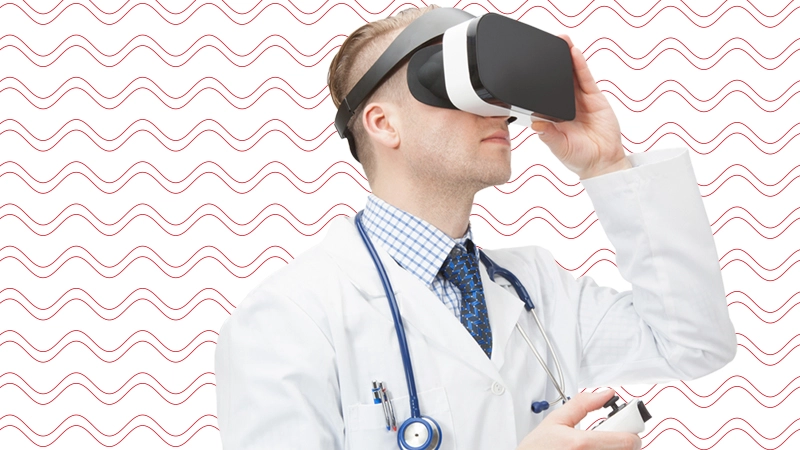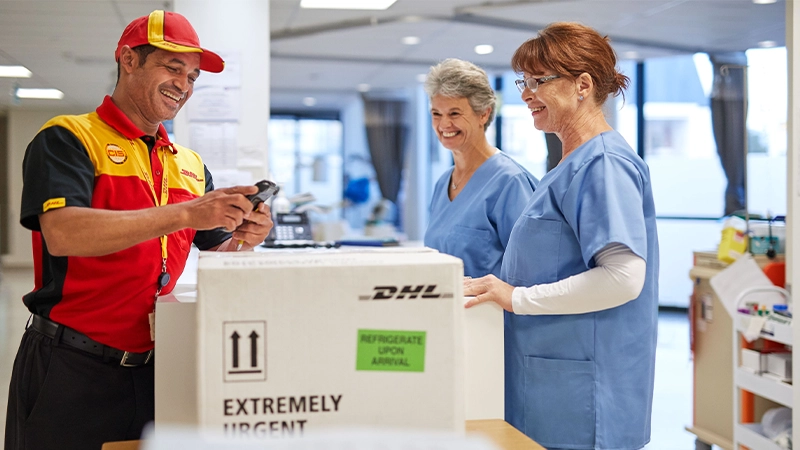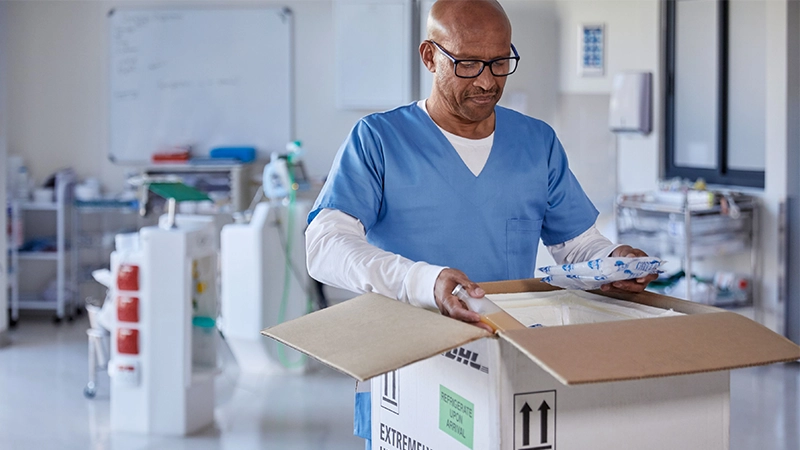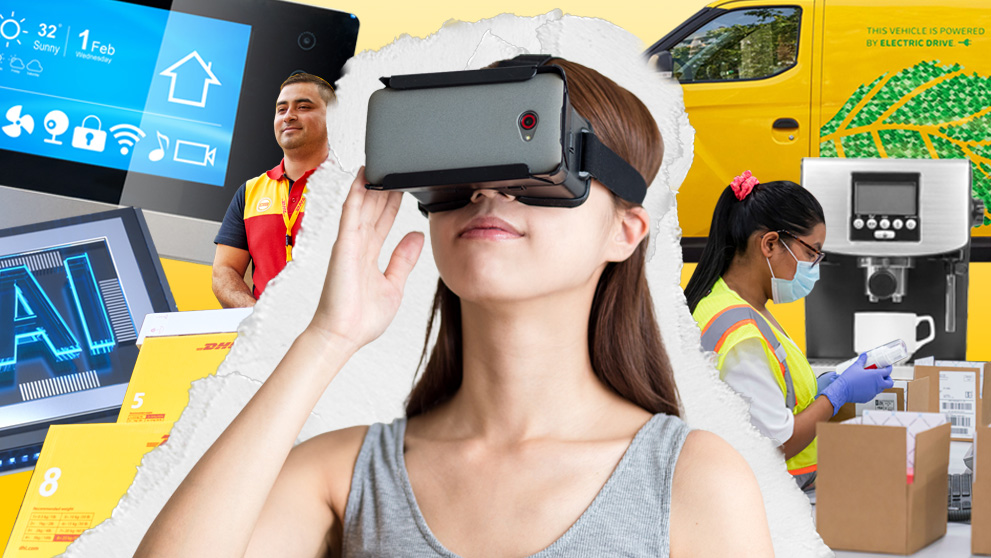What trends are set to shape the medical device industry this year? With AI in the picture, the answer is more innovative than you may imagine. In this guide, we explore 2024’s top medical device technology, and the logistics insights that will enable businesses in the sector to ship to customers worldwide.
Medical Device Industry Overview
Medicine’s AI era
The rapid advancement of AI is transforming the healthcare industry in ways that would have seemed unimaginable ten years ago.
On a consumer level, medical device technology is enabling people to monitor and track almost every aspect of their health. Whilst many of us are not unfamiliar with fitbits and step trackers, the more advanced of the wearable tech is now facilitating complex health diagnostics.
Earlier this year, at the Consumer Technology Assocation’s1 highly anticipated annual trade show – which showcases the sector’s most innovative trends and developments – AI-powered health devices were a key staple; specifically, those which enable remote diagnostics.
Taiwanese start-up FaceHeart2 unveiled its cutting-edge facial recognition technology which can detect six vital health signs – including heart rate, stress index and blood pressure – in 40-60 seconds by merging a simple smartphone camera with image processing algorithms.
Blueskeye AI3 showcased its newest machine learning tools which can analyze face and voice data and medically relevant behaviors to help healthcare professionals better interpret, diagnose and monitor patients’ health.
Meanwhile, food allergy company Alerje unveiled its “Omniject” auto-injector case4, which attaches to the back of the user’s smartphone whilst maintaining appropriate temperature. If a dose is activated, automatic alerts are sent to the patient’s allergist, first responders, and support circle – a remarkable example of a life-saving tool packaged into a user-friendly device for the smartphone generation.

In 2024, the global AI in healthcare market is forecast to be US$28 billion. This is expected to rise to US$188 billion by 2030.
Source: Statista(5)
Just as impressive is AI’s application to real-world training within the medical sector. PrecisionOS6, a software company which specialises in virtual reality (VR) surgery training and simulations, explains a common problem for trainees: “Surgery residents are getting less hands-on experience than ever, and it’s affecting their confidence and autonomy. A significant percentage don’t feel ready to independently perform core procedures upon residency completion.”7
PrecisionOS’s VR training scenarios include human anatomy, surgical instruments, medical devices such as orthopedic implants, and the operating theater itself. The company is now working with several global healthcare providers, giving them convenient, cost-effective and scalable routes to upskill medical personell.
Similarly, Meta’s Quest 38 is breaking new ground. The fully immersive headset enables surgeons to practice medical procedures in a simulated environment, meaning they can sharpen their skills from the comfort of their own homes – and of course, without any risk to patient safety.
So significant to the industry is the nascent technology, that many medical schools are now starting to insert VR into the curriculum.
Telemedicine 2.0
Telemedicine – the remote diagnosis and treatment of patients via digital channels – grew during the pandemic, and the last few years have seen the emergence of many “Doctor on demand” style apps. In 2024, telemedicine will grow further, driven by consumer demand for more convenient healthcare.

The global telemedicine market size was valued at US$87.4 billion in 2022, and is projected to grow to US$286.2 billion by 2030.
Source: Fortune Business Insights(9)
This year, AI-powered chatbots will play an increasing role in supporting telemedicine services. These “personal healthcare assistants” are now helping patients to schedule hospital appointments, manage prescriptions, and connect with medical specialists. They can detect early signs of diseases based on symptoms reported by patients, and offer information on treatments and post-operative care. They can even provide mental health support, guiding users to professional help.
Furthermore, chatbots’ ability to scan through vast amounts of data helps medical personnel drive precision medicine and improve clinical decision making. All of which means patients benefit from more personalized care, whilst healthcare providers save money and reduce waiting times. As we move through 2024, expect chatbots to be one of the biggest trends within the medical sector.
MEDICAL SECTOR: LOGISTICS GUIDE
Shipping insights & best practices
The shipping of medical devices and supplies can be a delicate process, due to the need for carefully controlled environments. DHL has a range of dedicated services to ensure their safe transit and delivery.

MEDICAL DEVICES
PACKAGING
For devices containing batteries, there will be some guidelines to follow to assure their safe transit. This guide to shipping batteries will ensure your shipment is compliant.
SHIPPING
DHL’s Medical Devices Logistics solutions guarantee the timely and secure delivery of lifesaving and medically necessary equipment to healthcare facilities and patients. Services include:
- Same Day Delivery: managing expedited ordering and the reliable, rapid shipment and delivery of medical devices and spare parts.
- Direct-To-X – Express: providing cost-effective, trackable domestic and international distribution of medical devices and consumables.
- Direct-To-X – Parcel: reliable, cost-efficient delivery of life sciences and healthcare consumables and low-value devices, ideal for e-commerce.
- Device final mile: bringing devices to the point of use on time every time, ensuring regulatory compliance, and handling returns.
Click here to discover the full benefits of DHL’s Medical Devices Logistics.

MEDICAL SUPPLIES
PACKAGING
- Some medical supplies – such as vaccines or lab samples – require a controlled-temperature environment during shipping. DHL Express has therefore developed an extensive range of packaging solutions to suit. This packaging guide will talk you through all the options.
SHIPPING
DHL Medical Express is specially developed for transporting time- and temperature-sensitive shipments for the pharmaceutical and medical industry. Whether shipments involve vaccines and medical supplies, or returning clinical supplies to central labs for analysis, DHL’s experienced specialists will guarantee fast and safe delivery.
DHL Medical Express’ services include:
- Temperature-controlled packaging for optimal protection of your shipment.
- Smart Sensor technology to monitor the temperature of your shipment during transport.
- Refrigerated material, including dry ice or gel packs to control the temperature of the shipment’s contents during transportation.
- Quality Control Centers to track your shipments during transport.
- Earliest possible delivery, with Saturday delivery if required.
- Customs specialists to guide the import and export process.
- Compliance with local, regional or International Air Transport Association regulations.
- Special support depending on the duration, locations, sensitivity and volume of shipments.
- Insurance: extra financial protection based on the true value of the contents of your shipment.
- Billing: flexible options for billing fees, charges and taxes.
Click here to discover the full benefits of DHL Medical Express and to connect with our experts.

FURTHER DHL EXPRESS SUPPORT
DHL Express has all the tools to help your business ship to customers seamlessly, wherever in the world they may be:
MyGTS (My Global Trade Services), a free, user-friendly platform that will help you navigate all aspects of international shipping regulations. Access accurate HS Codes for your shipment(s), calculate Landed Cost for goods in any country, and receive guidance on import restrictions before you ship.
DHL Express Commerce. Integrating with a large range of e-commerce platforms – including Shopify – this tool manages every step of your fulfilment process, from order importing to shipping, leaving you with more time to work on your business.
Dynamic Discounting. A competitive pricing program that rewards you with increasing discounts as your shipping volume grows, so the more you ship, the more you save. For in-depth cost estimates, speak to your Account Manager.
Shipping medical supplies and devices can be a delicate operation – you need a logistics partner with the expertise to help! With a DHL Express Business Account, you’ll have support from the experts as you navigate all aspects of international shipping.
1 – CES.Tech
2 – FaceHeart
3 – Blueskeye AI
4 – Alerje
5 – Statista, published September 2023
6, 7 – PrecisionOS
8 – Meta Quest 3




